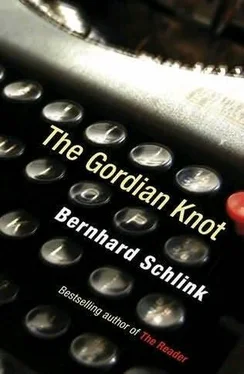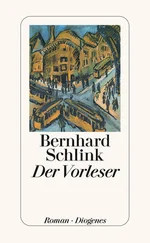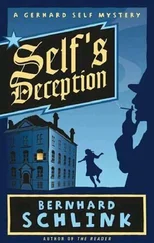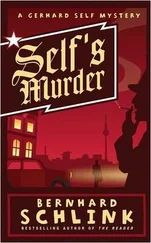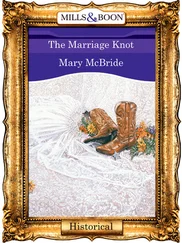Georg ordered a glass of white wine and gazed out at the street. The traffic flowed by in a slow stream; there were many yellow cabs, and the occasional black limousine with tinted windows and a TV antenna on its trunk. It began to rain. A street hawker appeared on the opposite sidewalk, selling umbrellas. A young man with shining red hair, holding his coat collar up, stood huddling by the entrance of a shoe store with a large display window that exhibited only one or two pairs of shoes on tiled stands.
The waiter brought an elderly gentleman and a young woman to the table and pulled out chairs for them.
“Mr. Cope?” Georg said, standing up.
“This is the European romantic I was telling you about, Lucy, the one who followed his sweetheart across the ocean!”
They sat down. Georg couldn’t take his eyes off Lucy. She was a beauty, an American beauty. Her face was sculptured, with high cheekbones, a strong chin, deep-set eyes, and a childlike mouth with full lips. She was slender, but with wide shoulders and big breasts. He had first noticed such women in commercials, and then had seen them on the street too. He had often wondered what gave them that special something that made them stand apart from European women. He looked at her and still couldn’t figure it out.
Cope eyed him with amusement. “She’s very beautiful and young, and destined to be a marvelous actress.”
“I’m springtime and Calvin is autumn,” Lucy said laughing, and by the time Georg thought of the compliment that he would consider himself lucky to be such an autumn, the moment had passed. The compliment would have been quite sincere, not only because of Lucy, but also because Cope obviously took great pleasure in his maturity and lifestyle. He had a full head of gray hair, and peered at the menu over his spectacles with a senatorial air.
“Leave the ordering to me,” Cope said. “I’ve been coming here for years. In the meantime, aren’t you going to say something?”
Georg hadn’t said a word yet. “I’m very grateful you have taken the time to see me, Mr. Cope. I don’t even know her real name: she wanted me to call her Françoise, as it’s a French name and she loves France. But I do know,” he lied smoothly, “that she was involved with the cathedral’s theater workshop and that she had a great teacher. She often spoke of it. This rather bad picture is the only thing I have.” Georg took out the photo and gave it to Cope, who passed it on to Lucy and looked at Georg pensively.
“Isn’t there a German poem about a woman searching for someone?” Cope asked. “All she knows is his name, and she follows him across the sea? Or is it the other way around, he follows her? My mother’s Swiss. She used to recite that poem when I was a boy.”
“Do you speak German?”
“I used to. But that poem-your touching story reminded me of it when we were talking on the phone. Do you know the one I mean?”
“Am Gestade Palästinas, auf und nieder, Tag um Tag…” Georg began.
“That’s it! I remember it now. Do you know the whole poem?”
“No, but I remember a Saracen maiden who follows a man to London, and then, lost in the crowds of the city, calls out ‘Gilbert’ and finds him. The man had been captured in one of the Crusades, and she had freed him. She only knew two English words: ‘Gilbert’ and ‘London.’ The poem says that love will cross the seas even with only two words. We learned it at school.”
“Well, let’s drink to that,” Cope said, raising his glass. “Now, let me see the picture.”
Lucy gave him the photo.
“What’s that poem about?” she asked Georg. “I didn’t quite understand.” She spoke in a soft American English, as if chewing on a potato. Georg told her about the poem and about Conrad Ferdinand Meyer and about his grandparents, who had lived by the lake in Zurich.
“I recognize the face,” Cope said suddenly. “That girl used to be in my workshop, but I just can’t remember her name.” He continued studying the photograph. “I’m not sure who might know. I never kept records. I have a good eye for faces and have never had trouble remembering who was paid up and who still owed me-not to mention that I always gave the students in my class new names.”
“Yes, they’re names that suit them,” Lucy said. “Calvin still does that, and most of the actors like it, and then keep it as a stage name.”
“But I know that you don’t like the name I gave you,” Cope said to her, “and autumn wouldn’t pick a fight with beautiful spring over a name, would he, which is why you are Lucy, nothing but Lucy, forever Lucy.” He laughed, but Georg wasn’t sure if there might be a touch of poison in his joviality.
The Châteaubriand arrived, was carved up, and served.
“Do you perhaps remember any of the other members of the workshop from back then?”
“No, I’m sorry, I can’t recall anyone. It’s been five or six years. You’re lucky I have such a good memory for faces, since this picture here is quite bad-was it you who took it? It’s no use. I’m sorry, but you’ll have to follow the example of the Saracen maiden. You crossed the ocean and came to New York convinced you’d find her, and now you’ll have to walk the streets of New York with the same conviction.”
Georg thought that sounded snide. Was Cope’s joviality indeed poisoned? Was he somehow irritated? Georg glanced out of the window. It wasn’t raining anymore, but the red-haired man was still standing in the doorway across the street. They ate in silence.
“Are you working on a new piece?” Georg asked in order to start a conversation.
“Why do you want to know? What do you know about the theater? What is all this? Goddamn it, nothing but idiots everywhere! First Goldberg, then Sheldon, and now this crazy lovebird from Europe!” Cope’s voice had gotten louder.
The waiter was more amused than put out, and seemed to be used to Cope’s scenes. Lucy put down her knife and fork, took a hairpin out of her bag, gathered her long, thick brown hair with both hands into a bun, and stuck it fast.
“Let’s go, I’ve had enough of this!” Cope shouted. “Waiter! Put the meal on my tab!” He jumped up and hurried down the stairs.
“It was nice meeting you,” Lucy said with a smile. “Can you write your name down? I can send you a ticket for opening night. I wouldn’t take any of this too seriously.”
Georg sat alone at the table in front of all the full plates. The waiter took the bottle out of the ice bucket and poured more wine. Georg ate the entire Châteaubriand and all the side orders and finished the bottle. The waiter brought him an espresso without asking if he wanted one and Georg ordered a brandy. He was celebrating. Françoise really had been in New York.
GEORG HAD NEVER BEEN SHADOWED BEFORE. Was it a coincidence that the red-haired man he’d seen from the restaurant window was now also strolling around the skating rink at Rockefeller Center? Georg stopped in front of boutiques, seeking the reflection of the street in the display windows, sometimes quickly glancing back. He knew this from the movies. He went into a bookstore and stood in the aisles, blindly leafing through books. It didn’t work: he could only keep the street in sight by standing next to the cashier. He went outside. It had started to rain again. There was a light gray haze around the tops of the skyscrapers, projectors throwing streams of light into the low-hanging clouds. Raindrops fell on his glasses. He looked up and felt as if he were soaring into a deep and starry sky, like the crane shot at the opening of some movies. The traffic was heavy, with a swarm of yellow cabs and crowds of people walking fast. Somebody bumped into him and he almost fell. He turned around, and though he didn’t see who had run into him, he caught sight of the red-haired man, who was now only a few yards behind him-he too without an umbrella, his wet hair plastered to his head.
Читать дальше
